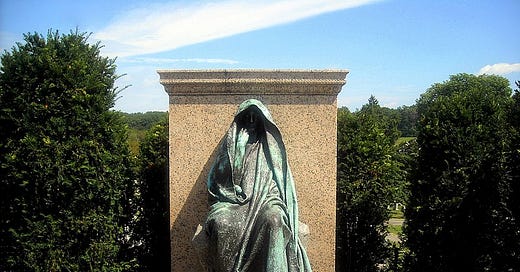Memorial sculpture by Augustus Saint-Gaudens commissioned by Henry Adams for his wife Clover. The sculpture was later nicknamed “Grief” by Mark Twain. Rock Creek Cemetery, Washington, D.C.
Grieving people are subjected to constant harsh judgment. You’re grieving too much. You’re grieving too little. You shouldn’t be crying. You shouldn’t (if you’re a widower) pursue female companionship. Get over it! How dare you be enjoying yourself! Now, the New York Times reports, the latest edition of the Diagnostic and Statistical Manual of Mental Disorders, a.k.a. the DSM, newly categories as a mental illness “prolonged grief disorder.” Let the pathologizing begin.
Firm rules about how best and how long to grieve ought not to exist. According to the Times report, initially there was talk of limiting the “normal” period of emotional incapacitation to six months, which, among other things, is at odds with religious (including Jewish) traditions. In the end, it was decided you get one year. Anything more and you’re Miss Havisham.
Well, it took me at least two. I was a fully functioning employee and father to two children, amazing my friends by setting to work immediately publishing a best-selling anthology of my late wife’s writings. I dated women. And I was a complete freaking emotional wreck.
Eleven months after my wife’s death a kind friend invited me to her annual New Year’s Eve dinner. I had another friend who lived next door. Before going to the dinner I stopped at that friend’s house and bawled like a baby for half an hour while he, his wife, and his mother sweetly tended to me. Then, exhausted, I proceeded to the dinner, where I couldn’t have been very good company. This behavior, had it occurred three weeks later, would have been judged outside the realm of normal by the DSM.
I don’t know what the new diagnosis says about the fact that 17 years after my first wife’s death I still on occasion weep over her loss, and that I try very hard on social media to keep alive memories of her work. I don’t think of this as pathology. I am happily remarried now, and before that I had two multiyear relationships with wonderful women. But you never really get over the death of a spouse or a sibling or a parent and I’d mistrust anyone who did.
Labeling grief as a disease is useful, I suppose, in helping people who suffer from it get help that’s covered by insurance. But that’s always a tricky bargain, because the realm of human experience that doesn’t enter the DSM just gets smaller and smaller. We need a new vocabulary for the pain of being human, and more practical and expansive ways to think about helping people afflicted with it that doesn’t require us to play games with insurance companies. If grieving is most debilitating during the first year—and I don’t dispute that usually it is—why can’t you get insurance companies to cover psychotherapy for that? Because it isn’t mental illness? Our whole apparatus for easing mental affliction is objectively insane.
I’m an admirer and enthusiastic consumer of psychotherapy, but I’m inclined to believe we overuse medical science as a salve for ordinary mental suffering and underuse the humanities and (for those so inclined) religion. People have been contemplating these matters for thousands of years, many of them with surpassing insight and beauty, and we can’t afford to let this inheritance slip away just because it isn’t “practical” or entirely up to date. Long live the literature and art of our ancestors. Long live the wisdom bequeathed by centuries of dead geniuses all over the world. We can learn from them without being corrupted by whatever blinders they wore or injustices they perpetuated. Let’s honor these dead by allowing them to help us understand human experience, of which death itself is the most universal.





I lost my sister 35 years ago. I was a suicidal teenager, raised to believe psychotherapy was what rich people do. But I made it. The thing is, though, that I still grieve for her intensely at times. It makes me feel close to her. I’m the only member of my family who will bring her up in conversation, uncovering good memories and things about her that would have been forgotten. Grief is truth. Grief is love. It is a wilderness that you were thrust into, but years later you go back into it; a ritual of love and longing.
Thanks. Heck, I still miss your first wife, and I was only a reader of her columns. My son’s wife was diagnosed with a rare and aggressive cancer in November. Their girls are toddlers. The landscape changes completely. This essay means so much to me both in terms of respecting the depth of the loss and maintaining hope for the future.